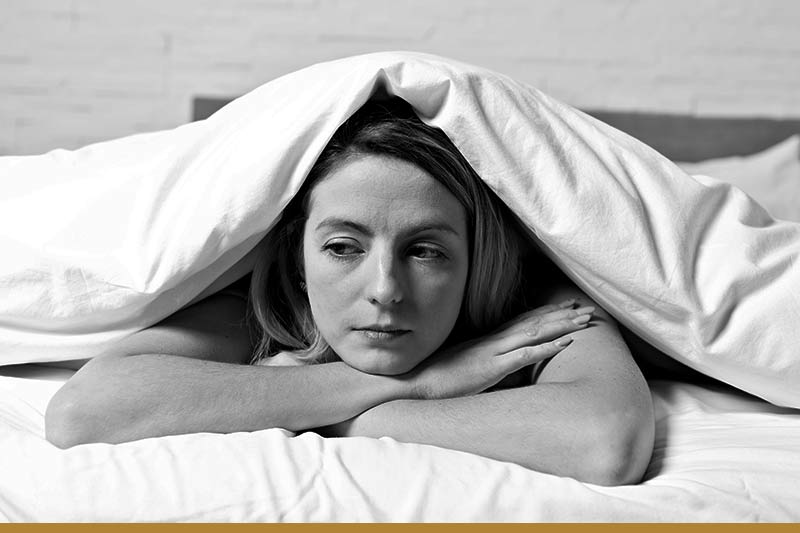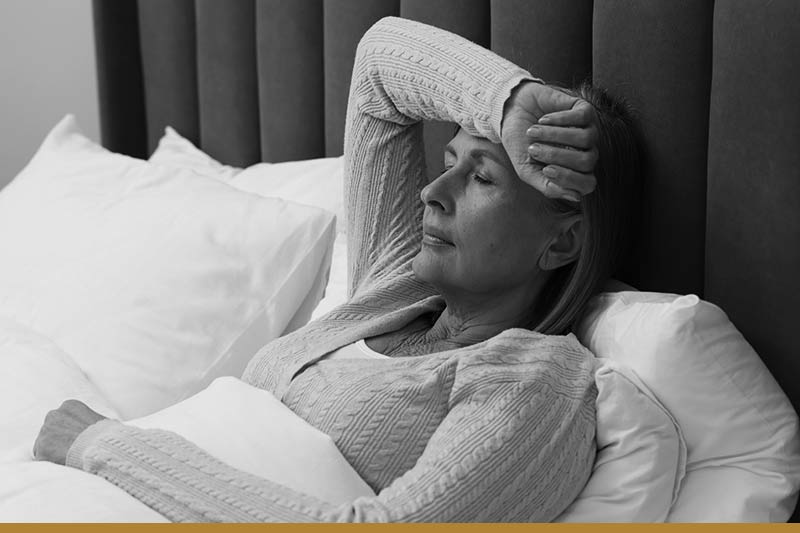A hormonal imbalance may provoke a sudden hot flash, rapid heartbeat, and a drenching night sweat that disturbs your sleep and leaves you exhausted throughout the day. Profuse night sweating is also a symptom of certain underlying health condition that require medical help.
This article explains the connection between night sweats and hormones and how to prevent and eliminate this uncomfortable condition.

Hormonal sweating occurs due to hormonal fluctuations and typically affects women during menopause, PMS, or pregnancy. Lower estrogen levels can provoke night sweats (nocturnal hyperhidrosis), a condition usually accompanied by hot flashes, skin reddening, and chills.
Night sweats can also be a symptom of hypoglycemia, gastroesophageal reflux disease (GERD), neurological conditions, anxiety, and even cancer. Consult a healthcare provider to rule out non-hormonal causes and get an adequate treatment.
Sweating is a healthy body heat regulation mechanism that prevents overheating in hot environments or during physical exertion. The hypothalamus, which controls body temperature, plays a crucial role in this process. However, hormonal changes can disturb the body’s cool-down response and cause night sweats.
The following hormones are responsible for hormonal night sweating:
Note: Discover 14 symptoms of low estrogen and learn how to increase estrogen levels to reduce night sweating and alleviate accompanying symptoms.
Hormone-induced night sweats are common during sudden or significant hormonal changes. Managing each condition can alleviate the discomfort and minimize potential complications.
Estrogen levels peak during the mid-follicular and mid-luteal phase, dropping right before menstruation starts. Over 90% of women will experience premenstrual symptoms during the second stage of the luteal phase when both progesterone and estrogen levels decrease. Common PMS symptoms include bloating, headaches, moodiness, and occasionally excessive sweating.
Premenstrual dysphoric disorder (PMDD) affects up to 5% of women during their reproductive years. PMDD requires medical assistance and is characterized by severe PMS-like health issues. It has also been linked to night sweats.
Increased sweating is common during pregnancy, especially during the first trimester (weeks 1 to 14) and the third trimester (weeks 27 to childbirth). The body fails to achieve an optimal temperature due to fluctuating hormones, increased blood flow, or thyroid issues.
Postpartum night sweats are also common and typically subside within a few weeks. They are triggered by the sudden drop in estrogen levels immediately after delivery.
During perimenopause, the ovaries start producing less estrogen, progesterone, and testosterone. Women may experience a range of symptoms, such as irregular periods, hot flashes, and night sweats. As the body slowly transitions out of its reproductive years and enters into menopause, the hypothalamus begins to have difficulties maintaining optimal body temperature, resulting in heat waves and increased sweating.
Note: Learn about the difference between perimenopause and premenopause.
Primary ovarian insufficiency (POI), also known as primary ovarian failure, is a rare medical condition that affects pre-menopausal women, causing ovaries to stop making eggs before the age of forty. POI leads to premature menopause and infertility. It is accompanied by symptoms such as vaginal dryness, sleep issues, anxiety, hot flashes, and night sweats often accompany it.
Drenching night sweats may also signal an underlying problem with the thyroid gland. Thyroid hormones T3 and T4 affect thermoregulation by influencing the basal metabolic rate on a cellular level.
Hyperthyroidism (an overactive thyroid) is typically associated with heat intolerance, clamminess, and excessive sweating caused by increased body heat.
Hypothyroidism (an underactive thyroid) usually decreases sweating and increases cold sensitivity. However, patients may also sweat more due to the difficulty their body has regulating temperature or as a side effect of hypothyroidism medication (levothyroxine).
Note: Night sweats can also be caused by a host of other disorders that aren’t linked directly to a hormonal imbalance so make sure you speak to your physician, who will perform the necessary tests to pinpoint the cause of this uncomfortable condition.
You can try the following preventive measures to reduce sweating at night.
Note: Learn about the connection between stress and hormones and discover more actionable ways to destress.

Treatment for hormonal night sweats varies depending on the underlying cause or medical condition. Discuss your options with a healthcare provider before making any changes.
The doctor will discuss your medical record, perform a physical examination, and run a hormone test to determine the root cause and ensure the appropriate treatment.
Hormone replacement therapy (HRT) addresses hormonal imbalance and alleviates uncomfortable symptoms like nighttime sweating. HRT involves the use of medication to replace deficient hormones, such as estrogen, progesterone, and testosterone.
Bioidentical hormone replacement therapy (BHRT) includes the use of bioidentical hormones, whose molecular structure is identical to naturally occurring human hormones. These plant-derived hormones effectively reduce hot flashes and night sweats alongside other symptoms, such as brain fog, low sex drive, and insomnia.
Testosterone therapy (TRT) restores depleted testosterone to optimal levels, providing numerous health benefits for both men and women. It helps mitigate symptoms of male hypogonadism and relieves menopausal symptoms. Testosterone is used off-label to increase energy, improve sex drive, and aid in weight loss.
The following non-hormonal medication has also been found to relieve night sweats:
Natural remedies can relieve symptoms of menopausal discomfort, such as mood swings, hot flashes, and heavy sweating. The following herbal cures can effectively manage symptoms and are a popular alternative to pharmaceuticals:
Use these products with caution and with your doctor’s approval to avoid risks and health complications. Natural remedies are not as tightly regulated as prescription drugs and may provoke adverse effects. Some natural supplements should be avoided during hormone therapy (e.g., red clover).
Small adjustments in your daily habits can significantly impact sleep quality, reduce night sweating, and improve overall comfort. Practice each habit consistently to ensure faster and more durable results.
Note: Learn how to lower cortisol levels with 7 natural strategies.
Hormonal night sweats vary widely in frequency, intensity, and duration depending on the cause, symptoms, and other factors (e.g., stress levels and environmental conditions). They can occur sporadically or consistently throughout the entire hormonal shift.
Menopausal women may experience several sweating incidents per night that last a few moments up to fifteen minutes.
Sweats can last a few days, weeks, months, or several years during post-menopause. PMS-triggered sweats usually subside after several days, while pregnancy-related perspiration may stretch for weeks.
Night sweats are not a cause for concern as they usually subside over time. However, they may be a symptom of a more severe health condition (e.g., an infection, diabetes, or cancer) or a side effect of a medicine.
Schedule a visit with a healthcare provider if you experience persistent night sweats that interrupt your sleep or if you notice any of the following:
Excessive nighttime sweating can be a sign of different hormonal imbalances. Prevention, proper diagnosis, and timely treatments help you restore balance and stop the sweats that leave you soaking wet in the middle of the night.
Learn more about hormone therapy at Vibrant Vitality Clinic and schedule a visit to get a tailored treatment for your health concern.




4325 E Indian School Rd, Suite 130
Phoenix, AZ 85018
United States
(480) 422-2058
info@vibrantvitalityclinic.com
Monday - Friday: 9:00 am - 6:00 pm
Saturday: 9:00 am - 3:00 pm
Sunday: Closed
